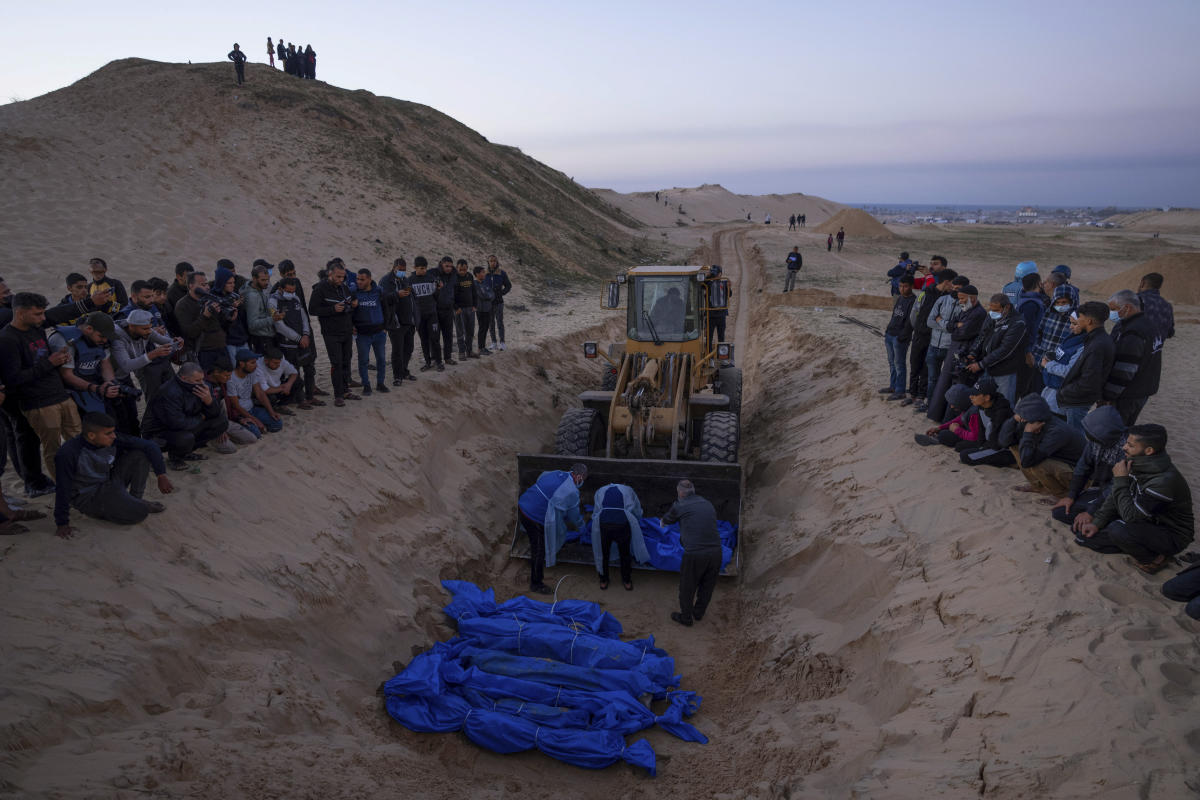BEIRUT (AP) — To an extent never seen before, Israel’s air and ground campaign in Gaza is killing entire Palestinian families.
Entire bloodlines, sometimes four generations of the same family, have been killed in a single air raid or a series of air raids on members of the same family sheltering together from the bombs. Often there is no warning.
An Associated Press investigation found that at least 60 Palestinian families were killed in bombings between October and December. It was the deadliest and most destructive phase of the war, now in its ninth month.
These are the most important conclusions from the AP analysis:
There is no one left to document the toll
Several families have almost no one left to document the toll and thousands cannot account for all their deaths because there are so many bodies under the rubble.
The AP assessment included casualty data released by Gaza’s Health Ministry through March, online obituaries, family and neighborhood social media pages and spreadsheets, accounts from witnesses and survivors, as well as data from Airwars, a London-based conflict monitor. AP also geolocated and analyzed 10 Israeli attacks, among the deadliest in the war, between October 7 and December 24. Together, more than 500 people were killed in the attacks.
Among the worst hit are the Mughrabi family: a single Israeli airstrike in December killed more than 70 people. The Abu Najas: More than 50 people were killed during the October strikes, including at least two pregnant women. The great Doghmush clan lost at least 44 members in an attack on a mosque, with the total rising more than 100 weeks later; by the spring, more than 80 members of the Abu al-Qumssan family had been murdered.
“The figures are shocking,” said Hussam Abu al-Qumssan.
No warning, no access
Gaza was under siege before the war, but since October 7, Israel and Egypt have completely blocked access to outside reporting teams or independent researchers. Hundreds of local reporters juggled covering the brutal Israeli bombing campaign – 6,000 in the first five days of the war – while running for their own lives and seeking shelter for themselves and their families.
In the first month after Hamas’ deadly attack on Israel on October 7, which killed about 1,200 people, Gaza’s Health Ministry said 300 Palestinian families lost more than 10 members. That is twice as many as during the devastating 51-day war of 2014.
The ten strikes analyzed by AP mainly affected residential buildings, houses and shelters where parents, children and grandparents sat together for safety. In no case was there an obvious military target or direct warning to those inside. The Salem family has lost at least 270 members in total.
At one point, the Salems raised a white flag on their building, which was in the middle of a combat zone. They told the army they would not leave because they said it was not safe anywhere.
More than 170 members of the family were killed in two bombings eight days apart. Thirty al-Agha members were killed in three strikes over four weeks; and a series of strikes in a refugee camp in December left 106 people from at least four families dead. An attack on December 24 marked the first time Israel admitted it had “wrongly” struck near its intended targets.
In one attack in the busy Jabaliya refugee camp in northern Gaza, Israeli bombs wiped out an entire block of buildings. Nearly 40 members of the Abu al-Qumssan family were killed, while the toll for that October 31 attack remains unknown. Unusually, Israel identified a target and said it was going after a senior Hamas commander.
Why it is part of the war crimes and genocide cases
Israel has said it is taking measures to limit harm to civilians. In previous conflicts, it often directly warned civilians that they would be targeted. But in this war that method is rarely used and replaced by evacuation orders for entire areas that not everyone can or wants to obey.
When civilian deaths are involved, the law of war comes down to a question of proportionality: whether the military advantage justifies the destruction.
The world’s highest court, the International Court of Justice, is investigating whether Israel is committing genocide against the Palestinians in Gaza. Killing families across generations is an important part of the case.
In addition, the International Criminal Court prosecutor is seeking arrest warrants for two Israeli leaders for war crimes and crimes against humanity, including the intentional killing of civilians, and for three Hamas leaders for crimes related to the October 7 attack.
Craig Jones, a lecturer at Newcastle University who has studied the role of Israeli military lawyers, said Israel has clearly relaxed its standards for civilian casualties, fueled by anger over the October 7 attacks and domestic politics.
The laws of war make possible a “kind of hasty form of warfare” with more civilian casualties, where an army must respond quickly and under changing circumstances. But “Israel is so clearly breaking the law because it is pushing the rules so far,” he said.
How the deaths affect the Palestinian future
The deaths of so many Palestinian families will resonate for generations to come. Kinship extends far beyond the nuclear family in Gaza. Compounds, often several buildings of three stories or more, are occupied by an entire bloodline.
When the Salem family home in northern Gaza was destroyed in 2009, Youssef and his brothers helped rebuild it for their father and uncles. In 2014 it was damaged again. Now it’s a skeleton, set on fire from the inside.
Palestinians will remember entire families missing from their lives, said Ramy Abdu, chairman of the Geneva-based EuroMed Human Rights Monitor, which monitors the war in Gaza.
“It’s as if an entire village or hamlet has been wiped out.”







